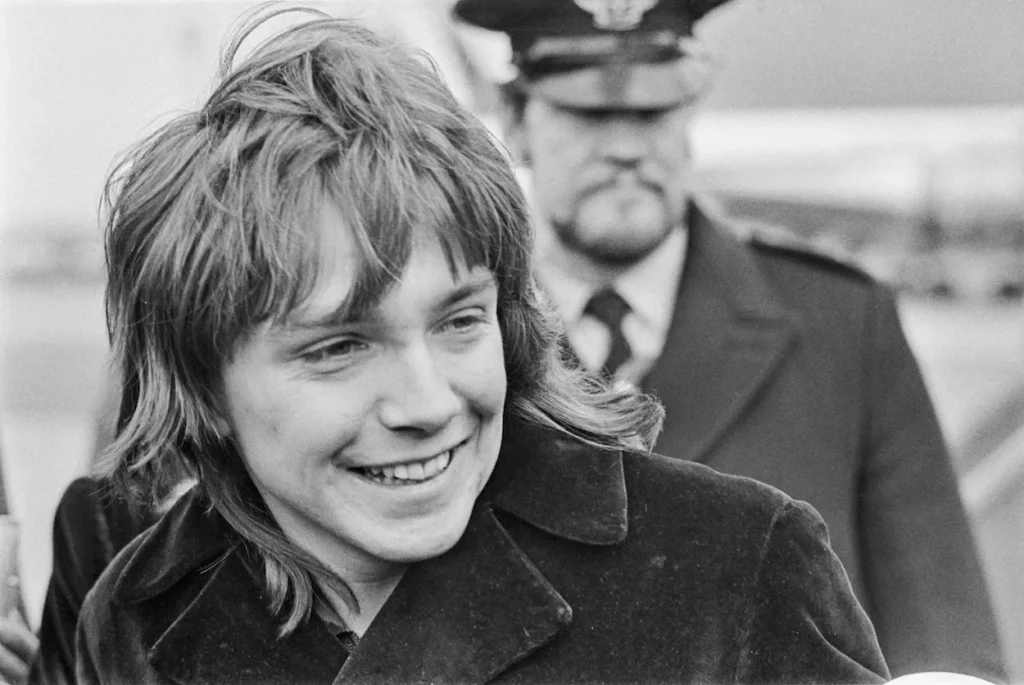
“Song of Love” is a soft landing after a restless record—David Cassidy letting the bravado fall away until only tenderness remains, like the last light in a room you don’t want to leave.
By the time David Cassidy reached “Song of Love,” the final track on his 1972 album Rock Me Baby, the performance feels like a deep exhale—an artist stepping out from the bright machinery of early-’70s fame and singing, for a moment, as if no one is watching. The song is track 11, running 3:34, and it closes the album with a kind of gentle, almost devotional calm.
The hard facts matter here, because “Song of Love” is often mistaken for a single-era highlight. It wasn’t. “Song of Love” was not released as a single, so it carries no standalone chart peak of its own; its public “position” comes through the album that carried it. And that album—Rock Me Baby, released in October 1972—was a genuine commercial force in the UK, reaching #2 on the Official UK Albums Chart. In other words: this song ended an album that was being heard at scale, even if it remained a deep-cut secret rather than a radio headline.
The credits are refreshingly clear and important for accuracy: “Song of Love” was written by Adam Miller and produced by Wes Farrell. Farrell, so closely tied to Cassidy’s early recording identity, knew how to frame his voice—how to give it softness without making it small, how to keep a pop sheen while letting vulnerability show through. And on a closing track like this, that framing becomes emotional architecture. You can feel the producer’s instinct: don’t rush the goodbye; let it linger.
What makes “Song of Love” especially moving is where it sits in Cassidy’s story. Rock Me Baby was part of a period when he was stretching beyond the tidy, TV-shaped expectations that followed him. The album leans into rock, soul, and more adult textures, and it asks the listener to see him as a singer with range—not only a face on a poster. “Song of Love” doesn’t fight for that credibility with grit. It earns it with intimacy. It says: after all the noise, I still believe in something simple, and I can sing it without hiding behind attitude.
The lyric itself is built around a beautiful, almost old-fashioned metaphor: life as music, love as the theme. It’s the kind of sentiment that could turn corny if delivered with a wink. Cassidy doesn’t wink. He treats it with sincerity—an earnestness that was, paradoxically, one of his greatest strengths. When he sings it, the song feels less like a grand romantic speech and more like a personal philosophy: that love isn’t a momentary thrill, but the underlying melody you return to when everything else changes.
Musically, “Song of Love” functions like twilight. It doesn’t explode; it glows. As an album closer, it offers emotional resolution rather than narrative resolution—more a mood of acceptance than a plot twist. And that is precisely why it stays with people who discover it. Many listeners come to Cassidy expecting the famous hits and the bright urgency of youth. “Song of Love” surprises them with something quieter: the sound of a young man already sensing that the world moves fast, and that you have to hold onto what’s gentle while you can.
The deeper meaning, in the end, is about belonging—how love can be a structure, not just a feeling. Cassidy’s performance suggests that amid fame’s constant motion, there’s a longing for something stable: a shared “theme” that doesn’t vanish when the spotlight moves on. It’s not a song that begs for attention. It’s a song that offers comfort—and comfort, when it’s sincere, can be more enduring than excitement.
That’s why “Song of Love” works so well as the final page of Rock Me Baby: it leaves you not with spectacle, but with a human warmth—like the last conversation of the night, when the room finally goes quiet and the truth comes out softly.e house together long after the applause has moved on.